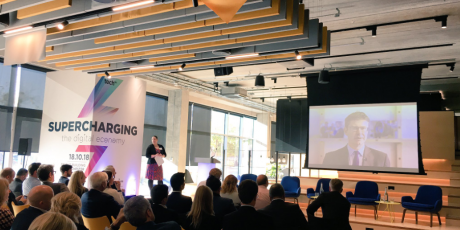
Supercharging the UK economy will only be possible if it’s a countrywide priority
Last week, I was at the Bright Building in Manchester – home to our Mi-IDEA innovation centre – for the third in a series of events by techUK called Supercharging the Digital Economy.
As the title suggests, these events are focused on the issue of how we use technology as a country – and how it can help drive the UK’s economy, by boosting productivity and benefitting citizens nationwide.
For me, this means taking discussions about technology beyond the tech sector. If we’re going to apply technology’s benefits nationwide, we need to consider how it can (and will) be used across all sectors and industries.
Over the course of the day, amid contributions from across the public and private sectors, it became clear that the UK is in a strong position to deliver on the promise of a digital future.
Our nation’s strong research pedigree is today backed up by a wealth of bold new start-ups and a growing number of innovation centres that exist to support them and their partners in enterprise.
The government’s industrial strategy, too, is geared towards putting digital at the heart of the UK’s future.
However what was also clear – as ever – were the challenges that will first need to be surmounted if we’re going to reach that future.
The skills challenge
Digital skills, and the gap that continues to hang between their supply and demand, remain a constant on the agenda.
Without real investment, this isn’t going to change any time soon. Increasingly, it’s not just the tech sector looking to employ people with high-end digital skills: every job will soon have a digital element to it.
Both businesses and the education system need to contribute. Speaking early in the day, techUK CEO Julian David expressed the need for businesses to be producers of skills and not just consumers of them.
Meaningful regional investment
Additionally, the UK’s investment in its digital future needs to be countrywide.
In this respect, Manchester was a fitting location for the event: the city, with its blossoming tech sector, is a shining example of what can be achieved when the focus shifts from London and the south east.
But more needs to be done – it would be naïve to argue that the majority of policy and investment remains London-focused.
Regional growth and development presents a huge opportunity, and events like last week’s are encouraging people in the capital to look beyond their city’s bounds. I can’t help but see this is as a positive, even vital thing.
A country made smarter
Last year, Cisco made a significant contribution to the Made Smarter Review.
The paper was published in response to the government’s UK industrial strategy green paper and focused on efforts to speed up adoption of industrial digital technologies in the UK’s manufacturing industry.
This summer, as part of Made Smarter, we received approval and funding to pilot a new National Adoption Programme in the north west. The pilot could address as many as 3,000 SMEs in the region, helping them to re-skill or up-skill their workforces to thrive in a digital future.
In this way, the pilot responds to the core challenges presented by the digital skills gap and the need for more regional development.
Just last month my colleague Sarah Martin reflected on Mi-IDEA’s first year in operation and the extent to which it’s helped draw the attention of leaders from across government as well as industry.
Projects like CityVerve have also demonstrated the value of investing and innovating in our regions.
Ultimately, the aim of programmes like Made Smarter – and Cisco’s Country Digital Acceleration efforts more broadly – is to embrace the fourth industrial revolution at the scale and pace that will ensure the UK maintains its status as a leader in digital and business growth.
This momentum gathering in the north needs to be harnessed. Clearly if we are going to supercharge the UK’s digital economy, we need to seize the opportunities that abound outside the capital too.
Tags:


